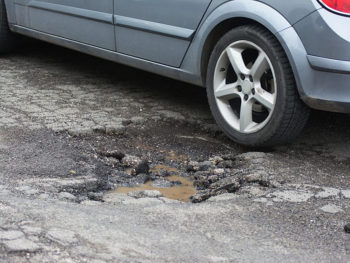£93m funding boost to fix UK’s crumbling roads and develop AI pothole detection tech
The Department for Transport is funding more than £93m in improvements to the road network, including investment in transport technology to help cut the number of potholes.

The Transport Committee and the Department for Transport are putting pressure on the Treasury for long term funding to tackle the blight of pot holes
The announcement brings a total of £93.4m to be shared out across 32 local authorities to repair roads and bridges, in a move to improve road conditions and cut congestion. According to RAC Foundation research issued today, there are 3,061 substandard bridges in England, Scotland and Wales, although this has fallen 4.2% over 12 months from 3,194.
An additional £900,000 will be used to fund research into new ways to future proof the UK’s roads. This includes a project to develop a new AI-powered app to detect potholes in real-time, using mobile phone sensors to measure when cyclists ride over or swerve to avoid them. It is hoped the app will help local authorities to quickly identify when potholes are forming and take quicker action to fill them.
Another project known as Shape-Pot will create 3D pothole models to create a fully autonomous repair platform capable of automatic, uniform repairs, seen as a first step toward autonomous maintenance of roads.
The new funding forms part of the £6.6bn awarded between 2015 and 2021 to improve the condition of the local highway networks.
The Freight Transport Association (FTA) welcomed the news. Christopher Snelling, head of UK policy, said: “The road network has been subject to chronic underinvestment for many years. Businesses within the logistics sector rely on efficient, effective road networks to keep goods moving across the UK, but too often, these operators are forced to travel along damaged, congested roads which increase journey times and can cause costly damage to vehicles. These businesses are paying the price for an ongoing lack of investment in the road network; the performance of the UK economy has also suffered as a result.”
However, according to the Asphalt Industry Alliance (AIA), bringing the UK’s local road conditions up to scratch requires a £15bn investment over the next decade to ensure potholes are prevented from forming in the first place.
Speaking last month for National Pothole Day 2020 (15 January), the campaign group said there was a need for government intervention to tackle the growing pothole crisis.
Although the Conservative party promised to spend £2bn on “the biggest ever pothole-filling programme” if it got into power at the last election, various organisations including the AIA have said that investment in effective road maintenance is needed to improve the condition of the roads overall.
Commenting on the latest funding, Rick Green, chairman of the AIA, said: “The sums involved will do little to address the overall condition of our vital local roads. Hard-pressed highway teams continue to report insufficient funding and, last year, our Annual Local Authority Road Maintenance (ALARM) survey highlighted that the annual carriageway budget
shortfall reported was up nearly 20% – with a one-time catch-up bill now touching £10bn.
“We’ve been calling for £1.5bn extra per year for the next 10 years to bring local road conditions up to a level from which they can be maintained cost effectively going forward. This investment would be a sensible allocation of part of the £100bn pot being pledged by the Government. We call on the new Chancellor not to overlook local roads, on which we all depend, again in the forthcoming Budget.”
The RAC also commented on the funding. Head of roads policy Nicholas Lyes said: “Extra funding for local highways maintenance is welcome as drivers continue to tell us that poor road surfaces and congestion are significant concerns. In the long term, local authorities and drivers would benefit from dedicated local roads funding in order to plan long-term maintenance, so we continue to call on the Government to consider ringfencing a small proportion of existing fuel duty revenues over a five-year period to give authorities more scope to plan essential works such as reducing the number of potholes, repairing road defects and investing in technology to improve road maintenance procedures.”

















